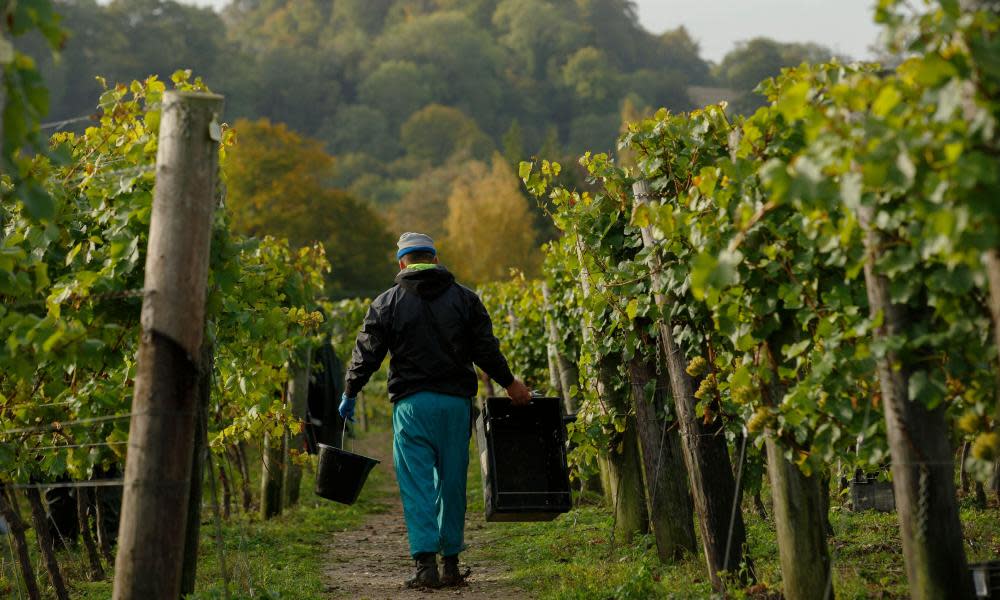‘Our fate is unclear’: Indonesian man who paid £1,000 deposit for UK farm job

The Instagram advert boasted “Job vacancies United Kingdom” above an image of plump lettuces and the promise of wages more than double most desk jobs in Indonesia.
When Intan (not his real name) saw it on his phone in Jakarta this summer, he couldn’t resist. He was no farmer but, with a wife and children to support, the economics were unarguable.
The ad was from Al Zubara Manpower, a Jakarta-based agency working with a British firm, AG Recruitment to find people to come to the UK to work as fruit pickers.
Over the summer, AG brought more than 1,200 Indonesians on seasonal worker visas to farms supplying most major supermarkets. But not everyone who showed an interest has made it to Britain.
In June, Intan says, he formally signed up with Al Zubaara, and he says the Indonesian agency told him that if he “really wanted the job” he could make a down payment to “guarantee” his place. He paid about £1,000 and hoped that soon he would be on his way.
The money was a lot – more than a month’s wages in his decent job in Jakarta – but the advert said wages in the UK would be up to £1,500 a month, and earlier posts had promised even more.
He says he was told by Al Zubara that he would have a meeting with AG’s managing director, Douglas Amesz, at the start of August to get him signed up and sorted with a visa. But Amesz never came.
Intan had already quit his job and was eager to get going. But as the weeks went by, no job or meetings with British recruiters materialised.
Amesz said he was unaware of this situation and never had any plans to come to Indonesia in August. He also said that a work finding fee, “termed as a deposit or otherwise”, was “illegal both in the UK and in Indonesia and is not condoned by AG in any way”.
Intan says there are many others like him waiting to come to the UK. “We know that plenty of candidates are crying every day, waiting for news from AG recruitment,” he says.
About 170 workers that had been given visas and assigned to British farms were still in Indonesia waiting to go in late August, according to documents.
Amesz said AG was aware of workers in Indonesia waiting to come to the UK and said he had interviewed “all remaining workers to establish their individual circumstances”. He said “bureaucracy in Indonesia” had delayed work permits for many, and that he had interviewed them about “what, if any, payments the workers have made and to who”.
Yet Intam has never spoken to Amesz, suggesting that Al Zubara has continued to look for more people since Amesz’s last visit to Indonesia earlier this year.
Amesz said he did the recruiting directly in Indonesia, and that “AZ were contracted by AG to carry out services in Indonesia to help us establish the demand letter (for the work pathway) and subsequently to provide local advertising via job boards. The contracts with AZ specifically made clear that they were not to sub-contract the work to third parties nor were they to apply charges to the workers.”
AG was given a licence in Indonesia to recruit 2,000 workers, which may explain why Al Zubara continued to advertise even after 1,200 had already arrived.
Some British farms are understood to be nervous of taking on workers after the Guardian reported that some had described taking on debts of up to £5,000 to unlicensed foreign brokers. Others now need fewer workers after the hot, dry summer resulted in a low-volume harvest.
Workers such as Intan who have not yet met Amesz or any representative of AG still hope that a solution can be found, “because some of us really desperately want to work there,” Intan says.
He adds: “We stopped working to be able to seriously follow the recruitment process for a new and better job. Now we are unemployed and our fate is increasingly unclear.”

 Yahoo Movies
Yahoo Movies 
